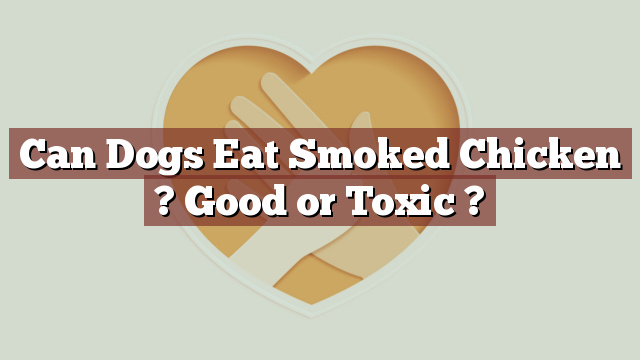Can Dogs Eat Smoked Chicken? Good or Toxic?
It is important for pet owners to be aware of the foods that are safe for their furry friends to consume. Dogs have different dietary needs than humans, and some human foods can be harmful or even toxic to them. One such food that often raises questions is smoked chicken. In this article, we will examine the nutritional value of smoked chicken for dogs, address its safety, discuss potential risks and benefits, and provide guidance on what to do if your dog eats smoked chicken.
Nutritional Value of Smoked Chicken for Dogs
Smoked chicken is a good source of protein for dogs. Protein is an essential component of their diet as it helps support muscle development, repair tissues, and maintain a healthy immune system. In addition to protein, smoked chicken also contains vitamins and minerals such as vitamin B6, niacin, phosphorus, and selenium. These nutrients play vital roles in promoting overall health and wellbeing in dogs.
Safety of Dogs Consuming Smoked Chicken: Good or Toxic?
Dogs can eat smoked chicken, but it is important to take certain precautions and considerations. While smoked chicken itself is not toxic to dogs, it is crucial to ensure that it is prepared and served in a safe manner. Avoid using any seasonings, spices, or marinades that may be harmful to dogs. Some ingredients commonly used in human recipes, such as garlic and onion powder, can be toxic to dogs and should be avoided.
It is also important to note that smoked chicken should be given to dogs in moderation. Feeding them excessive amounts of smoked chicken can lead to an imbalance in their diet and potentially cause digestive issues such as diarrhea or pancreatitis. Additionally, the bones in smoked chicken can pose a choking hazard or cause intestinal blockage if swallowed.
Potential Risks and Benefits of Dogs Eating Smoked Chicken
While smoked chicken can provide dogs with some nutritional benefits, there are potential risks associated with its consumption. As mentioned earlier, the bones in smoked chicken can be hazardous for dogs. Cooked bones, including those in smoked chicken, can splinter and cause serious internal injuries. It is essential to remove all bones from the chicken before feeding it to your dog.
On the other hand, the high protein content in smoked chicken can be beneficial for dogs, especially those that require a protein-rich diet. However, it is crucial to ensure that smoked chicken is not the only source of protein in their diet. A balanced and varied diet is essential for meeting all of their nutritional needs.
What to Do If Your Dog Eats Smoked Chicken?
If your dog accidentally consumes smoked chicken, the first step is to assess the situation. If the chicken was boneless and there were no seasonings or spices involved, the chances of any immediate harm are minimal. However, if your dog ingested bones or if you suspect that any harmful ingredients were present, it is recommended to contact your veterinarian for guidance.
It is always better to be safe than sorry when it comes to your pet’s health. Depending on the circumstances, your vet may advise you to monitor your dog for any signs of distress or recommend bringing them in for an examination.
Conclusion: Balancing Safety and Moderation in Canine Diet
In conclusion, dogs can eat smoked chicken, but it should be served in a safe and responsible manner. Always ensure that the chicken is boneless and free from any harmful ingredients. Moderation is key when it comes to incorporating smoked chicken or any human food into your dog’s diet. Remember to consult with your veterinarian if you have any concerns or questions regarding your pet’s dietary needs. By maintaining a balanced and nutritious diet, you can keep your furry companion healthy and happy for years to come.
Thank you for investing your time in exploring [page_title] on Can-Eat.org. Our goal is to provide readers like you with thorough and reliable information about various dietary topics. Each article, including [page_title], stems from diligent research and a passion for understanding the nuances of our food choices. We believe that knowledge is a vital step towards making informed and healthy decisions. However, while "[page_title]" sheds light on its specific topic, it's crucial to remember that everyone's body reacts differently to foods and dietary changes. What might be beneficial for one person could have different effects on another. Before you consider integrating suggestions or insights from "[page_title]" into your diet, it's always wise to consult with a nutritionist or healthcare professional. Their specialized knowledge ensures that you're making choices best suited to your individual health needs. As you navigate [page_title], be mindful of potential allergies, intolerances, or unique dietary requirements you may have. No singular article can capture the vast diversity of human health, and individualized guidance is invaluable. The content provided in [page_title] serves as a general guide. It is not, by any means, a substitute for personalized medical or nutritional advice. Your health should always be the top priority, and professional guidance is the best path forward. In your journey towards a balanced and nutritious lifestyle, we hope that [page_title] serves as a helpful stepping stone. Remember, informed decisions lead to healthier outcomes. Thank you for trusting Can-Eat.org. Continue exploring, learning, and prioritizing your health. Cheers to a well-informed and healthier future!

